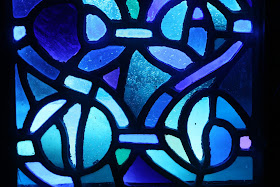Shout for joy, O daughter Zion!
Sing joyfully, O Israel!
Be glad and exult with all your
heart,
O daughter Jerusalem!
The Lord has removed the judgment against
you,
he has turned away your enemies;
The King of Israel, the Lord, is in your
midst,
you have no further misfortune to fear.
On that day, it shall be said to
Jerusalem:
Fear not, O Zion, be not discouraged!
The Lord, your God, is in your midst,
a mighty savior;
He will rejoice over you with gladness,
and renew you in his love,
He will sing joyfully because of you,
as one sings at festivals. Zephaniah 3
What might it be like to live and act as if God were rejoicing over us with gladness and constantly
renewing us in his love? With Mary most pure we can shout for joy for Jesus her Son in his self-emptying love is forgiving us over and over again.
Such is God's judgment- God sees exactly what we do, what we deserve, and out of
love chooses to remove the judgment against us.
The
Visitation, c. 1495, attributed
to Rueland Frueauf the Elder, German
(c. 1445 - 1507) Oil on
panel, 27 5/8 x 14 15/16 in., Fogg Museum.



























